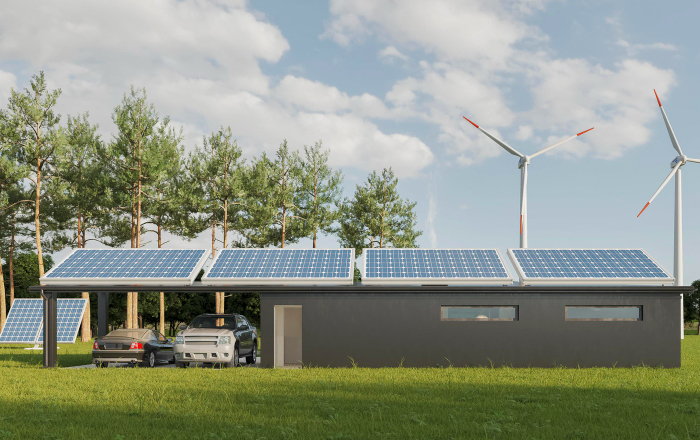Table of Contents
ToggleIf you are a homeowner ready to switch to solar energy for your property, you may be considering the pros and cons of buying vs leasing solar panels.
Difference between buying and leasing solar panels
The main difference between buying and leasing solar panels is ownership.
Buying solar panels
Buying the solar energy system for your home, either by cash or solar loan, gives you ownership and control of your solar panels. Solar loans are financing options for homeowners who wish to buy but pay monthly instalments. They are typically structured as fixed-rate loans, which means there will be no change in the interest rate.
Leasing solar panels
When you lease solar panels, it would either be a solar lease or a solar power purchase agreement (PPA). You can consider these two types of contracts if you have decided to lease from a solar company.
You will pay monthly rent for a solar lease, and for PPA, it’s a meter-based rate. However, the solar company will retain ownership of the solar panel system.
Pros and cons of leasing vs buying solar panels
Long-term savings
Whether buying or leasing solar panels, homeowners will benefit from savings in their energy usage bill.
However, long-term savings are more significant when you own the solar panel system outright. This is due to substantial savings in your electric bill throughout the solar panel system’s lifespan, typically 20 to 25 years or more.
On the other hand, with leased solar panels, you will be paying recurring monthly rent for the lease duration. The contract could also have an escalator clause that increases the lease amount annually.
Hence, you will be left with more modest savings on your energy usage with leased solar panels.
Tax credits and incentives
Homeowners in the US, who buy their solar panels, can take advantage of the federal clean energy tax credit, saving up to 30% of the total installation costs. Other state incentives include solar renewable energy credits (SREC) and net metering programs.
If you lease, the solar company receives the tax credit benefits because they own the solar panel system.
Monthly payments
Buying your solar energy system translates to no monthly payments. If you plan on taking a solar loan, you will only pay your monthly instalments for the duration of the loan.
However, leasing solar panels means a fixed rental needs to be paid every month for the duration of the lease, which is typically as long as the lifespan of the solar panels.
Maintenance and repairs
As the owner of the solar panel system, you will be solely responsible for its maintenance and repairs. Scheduling periodic inspections on your system will keep it running smoothly and mitigate the need for emergency repairs.
The upside of leasing the solar panel system is that the responsibility for maintenance and repairs falls on the solar company.
Read Solar panel maintenance.
Upfront cost
Homeowners need to be ready with significant money to buy a solar energy system.
On the other hand, one of the best advantages of leasing panels is that most solar companies do not charge an upfront fee – you’ll just have to pay the rental monthly.
Property value and sale
Most homeowners who can afford it prefer buying their solar panel system. Full ownership adds value to their property. Data from the National Renewable Energy Laboratory states that homes with PV systems sold 20% faster and for 17% more.
Signing a lease or PPA can make selling your home more tedious. The solar company must be involved in any discussion on selling the property while the lease is still active.
Read: Do solar panels increase home value?
How does leasing solar panels work?
The process begins with consulting a local solar company. There is usually little to no upfront cost, and the solar company retains ownership of the solar panel system.
The options would be a solar lease or PPA. With a solar lease, you would be paying a fixed monthly rental for the duration of the contract, typically around the 20 to 25 years lifespan of the panels.
On the other hand, signing a PPA means paying for the electricity you use at a fixed rate per kWh. However, the given rate would still be much lower than what you would pay for a conventional electricity supply, so you’ll still enjoy saving on your power bills.
Should I buy a house with leased solar panels?
If the property you are interested in purchasing comes with leased solar panels, you should examine the contract. Understand the payment terms, termination clause, and escalation clause. Once you are comfortable with the rental amount and terms, the solar company can transfer the lease to you.
But if the thought of leasing a solar panel is unappealing, you could negotiate with the home seller to pay off the lease or compensate you.
Is leasing solar panels worth it?
Leasing would be a good option if you are getting into solar and don’t want to deplete a large chunk of your savings. However, starting your solar journey with a lease and enjoying energy savings and doing your bit for the environment is worthwhile.


FAQ on buying solar panels vs leasing
Is leasing or buying solar panels cheaper?
You’ll need a significant amount of funds upfront to buy solar panels. However, in 7 to 10 years, the magnitude of savings will equal what you paid for the solar panel system. This is known as the solar payback period. From then on, you will enjoy even more considerable savings on your energy costs.
In comparison, although leasing solar panels does not require a large sum upfront, the monthly payments or fixed rate per kWh means less savings in electric bills. In addition, the amount decreases further if the contract has an escalator clause that increases the rental annually.
In the long run, it is cheaper to buy solar panels.
How to get out of a solar panel lease?
An escape clause in the lease contract would describe the available options. Unfortunately, in most cases, a penalty is instituted for premature release from the agreement.
How much is a solar lease per month?
Many factors influence the final cost of your solar panels. The price is specific to your home, electricity usage, solar company, and location. The solar lease can cost between $50 to $250 per month.
Can I get a tax credit if I lease solar panels?
No. State and federal tax incentives will benefit the solar panel system owner, the solar company.
What happens at the end of a solar lease?
At the end of a solar lease, you will have the option of renewing the contract. You may also opt for a newer solar panel and a new contract. Lastly, you may also choose to remove the panels.
Concluding remarks
Buying vs leasing solar panels depends on your budget.
If you are prepared with the cash, go ahead and make the purchase. However, if you want to go solar but do not have the upfront cash, then leasing is the best option.
All in all, buying or leasing, rest assured you are using cleaner energy and contributing to a greener and more sustainable environment.
For more on solar energy, check out JustSolar.com.





